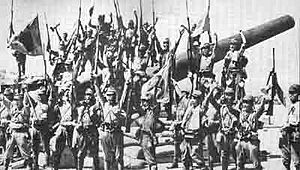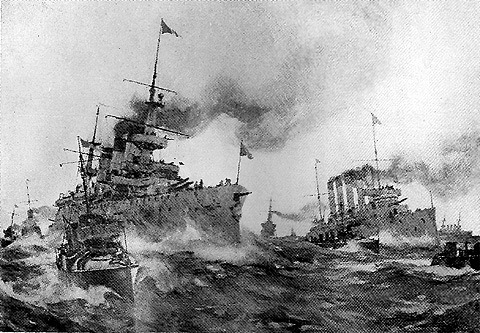Springtime for Heidler, and Austria
The winter did not see many large-scale actions in Europe, but it was far from tame. In Poland, Russia succeeded in finally destroying the last stronghold of the Polish Resistance in Lodz, but not without heavy loses. While the Russian papers wrote that Józef Piłsudski had been captured and shot, in reality he had been smuggled out of the city in the chaos of the Russian breakthrough. Currently he was making his way south towards the frontlines, while his followers continued to fight a bushwhacker campaign throughout Polish majority regions in both Russia and Germany. In Galicia, Austrian troops were advancing slowly against the Russian’s, with fighting more akin to the German Wars than anything else. The Austrians also held their own against Italy in the mountains, where wave after wave of Italian soldiers perished on the slopes to maxim gun fire and frostbite. In the Balkans, Serbia, Ottoman and Bulgarian troops unloaded on each other in vicious trench warfare. Surprisingly, Bavaria was mostly tame. There were very few actions to report, and the leading cause of casualties on both sides of the lines was not fighting but in fact things like frostbite and trench foot. Many papers would simply add at the end of their reports on the war with, “and all is still quiet on the Western Front.”
This would not last. As the cold retreated, Austrian troops readied for what its commanders believed would be a knockout blow to Germany. The attack would come in two stages. First was the distraction. There would be a sizeable attack into South Germany, to bring more German troops down to repel the invaders, and also hopefully to gain the support of the German Catholics in the region. The second attack would be the coup de grace. This would come from North Bavaria, a large hooking maneuver that would take Nuremburg, and then turn west, heading straight to the Rhine and trapping the German Army Group in the South. They would use speed and the help of Motor Infantry and Boxes to achieve surprise.
There was also a political motive behind the gamble. Secret negotiations had begun with France since the middle of the winter to join the war on the side of the Allies. Many considered it an unholy alliance, Austria had long been opposed to National Syndicalism, as did the United Kingdom. But more thought it was a necessary evil in order to restore the balance of power to Europe.
And so, on March 20th, Fall Ernte (Operation Harvest) went into effect. Landings at points along the Lech river resulted in the capture of border cities like Augsburg, Lansberg and Schongau, and German army units were soon screaming for reinforcements. By the time the second stage of Fall Ernte went into effect, the initial attack still had not been stopped as it thought it would be.
The second stage came a little less then two weeks later, on April 1st. This attack was overwhelming, led by now General Johann Heidler’s armoured columns. They captured Nuremburg almost without a fight, capturing thousands of terrified German prisoners. From there, the army turned to the west and the Rhine, with the main objective being Frankfort and Wiesbaden. Although the German army was routed at first, there were real attempts to stop the Austrian juggernaut. They almost succeeded too. During the Franconia campaign, German reinforcements taken from the fighting in Sudetenland were thrust at the northern flank of the advancing Austrians. This caused a fair amount of confusion, stalling the advance elements of Heidlers columns due to the danger of the flank collapsing under German pressure. However, Austrian troops stopped the counter-attack at Schweinfurt along the Main River, leading to an intense battle that lasted several days. With the front stabilized, Heidler resumed his advance, but the cost of those few days allowed the German reinforcements to regain their composure and dig in around Frankfort.
The Battle of Spessart lasted almost as long as the initial stages of the Kerndruck (central pressure) maneuver. The Germans knew if Frankfort was lost the Rhine would be opened up to Austria and would make continuing the war effort extremely difficult. And so in order to protect the city, the German Army dug in the low lying mountains to the east of the city, in order to stop the Austrians from breaking out into the fertile low-lands where Austria’s armored forces had an advantage. While General Heidler’s boxes and armored wagons could still function in the terrain, they weren’t as effective, and finally it seemed as though Germany had stemmed the tide.
It was not to be. The next blow would not come from Austria, but from France. On May 5th, the Valois-Grey Pact was signed in Caen, and Clemenceau announced that France would join with the Allies against Germany and Russia. Troops that had been placed at the border over the last few months, numbering over one million men, quickly defeated the skeleton border force and raced to meet the Austrians. With this, the defending Germans in the Spessart lost hope. Many retreated, some never to return to the frontlines. The defenders of Frankfort held out until the end of the month, finally surrendering due to lack of ammunition and the endless bombing raids from France and Austria. The two forces met a few weeks later farther north on the Rhine at the city of Koblenz.
The effects of this campaign could not be overstated. Not only did it revolutionize warfare, it brought France into the Allied camp and seriously injured Germany’s war effort. One of Germany’s largest Army Groups was surrounded by what General Heidler called a “Ring of Iron,” while much of the industrial strength of the Ruhr was out of commission. Even Cologne was now within striking distance for France and Austria. Germany was in dire straits, and things would only get worse before they got better…
Last edited:



